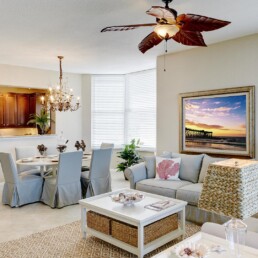Buying a condo or townhome can be an exciting opportunity to enjoy community living with added perks, like amenities and reduced maintenance responsibilities.
However, before you dive into a purchase, it’s crucial to consider a few important questions that will help ensure you’re making the right decision. Each community comes with its own set of rules, costs, and unique aspects, so it’s important to have a clear understanding of what you’re getting into.
Here are the key questions to ask before buying a condo or townhome to help guide your decision-making process.
How Much Storage is Available?
Is There Enough Space for Your Belongings?
One of the most common concerns for condo and townhome buyers is the lack of storage. Unlike traditional single-family homes, you may not have access to an attic, basement, or large garage to store extra belongings. Some condo communities offer storage lockers or shared storage spaces, but they may be limited in size or availability.
Before committing to a property, ask the seller or property manager about the available storage options. How much closet space is in the unit? Are there additional storage units in the building? Understanding the storage situation will help you determine if you can comfortably keep your things or if you’ll need to rent additional storage elsewhere.
Think Long-Term About Space
It’s also important to think about your future needs. Will your storage needs increase in the coming years? If you plan on growing your family or accumulating more possessions, storage will be a key factor in your decision.
How’s the Outdoor Space?
Do You Need a Yard?
Condos and townhomes often come with smaller outdoor spaces compared to single-family homes. If you’re someone who dreads yard work, this might actually be a plus! Many condos have minimal yards, and the community may hire landscapers to take care of the common areas. This means less maintenance for you, freeing up time for other activities.
However, if you love gardening or hosting backyard barbecues, the limited outdoor space may feel restrictive. Check to see what kind of patio, balcony, or yard the property has and consider whether it aligns with your lifestyle. Are there community parks or outdoor areas nearby that can make up for the lack of private outdoor space?
Are Amenities Important to You?
Perks of Community Living
One of the significant advantages of buying a condo or townhome is access to shared amenities. Many communities offer perks like swimming pools, fitness centers, clubhouses, and even tennis courts. These amenities can enhance your lifestyle and would likely cost a lot more to maintain individually in a single-family home.
Before buying, take a tour of the amenities and assess their quality. Are they well-maintained? Are the facilities something you’ll actually use? It’s also a good idea to ask how often amenities are updated or repaired. After all, if you’re paying for a fitness center or pool, you want to make sure they’re in good condition and available when you want to use them.
Consider the Costs
While amenities are a great benefit, they do come with a cost—typically through homeowner association (HOA) or condo fees. Make sure you’re aware of how much you’ll be paying for these perks (we’ll dive more into fees later).
Who Handles Maintenance and Security?

Less Maintenance Responsibility
One of the appealing aspects of condo or townhome living is the reduced responsibility for maintenance. Many communities have property managers who hire professionals to take care of common areas and sometimes even in-unit repairs. This can be a huge relief if you’re not a fan of mowing lawns, cleaning gutters, or handling home repairs.
Ask about the maintenance services included in your HOA fees. Does the community provide snow removal, landscaping, or trash collection? Are there on-site staff or services to help with emergency repairs?
Security Measures in Place
Security is another important aspect to consider. Larger condo buildings may have gated entry, security cameras, or even doormen. Make sure you’re comfortable with the security measures that are in place to regulate access to the building and your unit. Knowing you and your belongings are secure can give you peace of mind, especially if you travel often or live alone.
What Are the Reserve Funds and Association Fees?
Understand the Costs
When living in a condo or townhome community, you’ll likely be responsible for paying HOA fees or condo association fees. These fees help cover the cost of amenities, maintenance, and reserve funds for future repairs or unexpected expenses. It’s important to understand how much these fees are and what they include before buying.
Make sure to ask how often fees have increased in the past and what the reserve funds look like. Reserve funds are essentially savings the association sets aside for large, unexpected repairs (like roof replacements or plumbing issues). A well-funded reserve ensures that you won’t be hit with a surprise assessment to cover major expenses.
Stay Informed About the Rules
While you’ll have a say in some decisions as a homeowner, remember that the HOA or condo board will make final decisions about fees and future improvements. Even if you disagree with certain choices, you’ll still be responsible for paying your share of the costs.
What Are the Association Rules?
Restrictions and Bylaws
One of the most critical steps before purchasing a condo or townhome is thoroughly reviewing the association’s rules, covenants, and bylaws. These documents can dictate how you use your property, and some rules may be stricter than you anticipate.
For example, some condo associations prohibit home-based businesses, restrict pet ownership, or limit the ability to rent out your unit. If you plan to work from home, have pets, or see your purchase as an investment property, you’ll need to make sure the rules align with your plans.
Future Rule Changes
Also, keep in mind that rules can change. While you may have a vote in certain changes, it’s essential to be comfortable with the idea that some future decisions will be out of your control. If certain rules are non-negotiable for you, ask whether they’re likely to change before moving forward.
What’s the Average Vacancy Rate?
Thinking About Resale
Even if you’re buying your condo or townhome as a long-term residence, it’s never too early to think about resale value. One thing to consider is the vacancy rate in the building. If many units are sitting empty, it could indicate a lack of demand, which might make it harder to sell your unit in the future.
Ask the HOA or property manager about the average time on the market for units in the building and how many units are currently vacant. A high vacancy rate could also affect the overall feel of the community, making it seem less vibrant or active.
How Many Units Are Owned by Investors?
Financing Considerations
If you’re planning to finance your purchase with a mortgage, it’s important to know how many units in the building are owner-occupied versus investor-owned. Some lenders require a certain percentage of the units to be owner-occupied for them to approve financing.
A high percentage of investor-owned units could also affect the sense of community, as renters may not have the same level of involvement or commitment as owner-occupants
Can I Meet Other Residents Before Making an Offer?
Community Vibe
Finally, when you buy a condo or townhome, you’re not just buying a property—you’re buying into a community. Since you’ll share common spaces and decision-making responsibilities with your neighbors, it’s a good idea to meet some of the residents before making an offer.
If possible, attend an HOA meeting or strike up a conversation with people living in the community. This will give you a sense of the neighborhood vibe and help you determine if you’ll feel comfortable living there.

